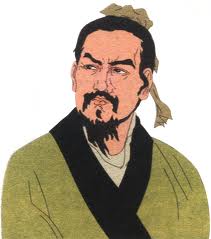Fa Chia (The Legalist School)
In Chinese history, Legalism (Chinese: 法家; literally "School of Law"; pinyin: fă jiā) was one of the main philosophic currents during the Warring States Period, although the term itself was invented in the Han Dynasty and thus does not refer to an organized 'school' of thought. Legalism was a utilitarian political philosophy that did not address higher questions like the nature and purpose of life.[1] The school's most famous proponent and contributor Han Fei Zi (韓非子) believed that a ruler should use the following three tools to govern his subjects:
Fa (Chinese: 法; pinyin: fǎ; literally "law or principle"): The law code must be clearly written and made public. All people under the ruler were equal before the law. Laws should reward those who obey them and punish accordingly those who dare to break them. Thus it is guaranteed that actions taken are systematically predictable. In addition, the system of law ran the state, not the ruler, a statement of rule of law. If the law is successfully enforced, even a weak ruler will be strong.
Shu (Chinese: 術; pinyin: shù; literally "method, tactic or art"): Special tactics and "secrets" are to be employed by the ruler to make sure others don't take over control of the state. Especially important is that no one can fathom the ruler's motivations, and thus no one can know which behaviour might help them get ahead, other than following the 法 or laws.
Shi (Chinese: 勢; pinyin: shì; literally "legitimacy, power or charisma"): It is the position of the ruler, not the ruler himself or herself, that holds the power. Therefore, analysis of the trends, the context, and the facts are essential for a real ruler.
Han Fei Tzu

Han Fei (also Han Fei Zi) (Chinese: 韓非; pinyin: Hán Fēi; Wade–Giles: Han Fei) (ca. 280 BC – 233 BC) was a Chinese philosopher who, along with Li Si, Gongsun Yang, Shen Dao and Shen Buhai, developed the doctrine of the School of Law or Legalism. Unlike the other famed philosophers of the time, Han Fei was a member of the ruling aristocracy, having been born into the ruling family of the state of Han during the end phase of the Warring States Period. In this context, his works have been interpreted by some scholars as being directed to his cousin, the King of Han.
Han Fei belonged to the school of Ancient Chinese Philosophy called Legalism. Legalism assumed that people were naturally evil and always acted to avoid punishment while simultaneously trying to achieve gains; Thus, the law must severely punish any unwanted action, while at the same time reward those who follow it. Han Fei Synthesized the ideas of Shang Yang, Shen Buhai, and Shen Dao, while borrowing Shang Yang's emphasis on laws, Shen Buhai's emphasis on techniques, and Shen Dao's ideas on authority and prophecy. Hen Fei's interpretation of Legalism stressed that the autocrat will be able achieve the ultimate ends of Legalist philosophy of firmly control the state with the mastering of three concepts: his position of power (勢, Shì); certain techniques (術, Shù), and laws (法, Fǎ) as described in his classic work, the Han Feizi (book).
Apart from the Confucianist Xun Zi, who was his and Li Si's teacher, the other main source for his political theories was Lao Zi's Daoist work, the Tao Te Ching, which he interpreted as a political text, and on which he wrote a commentary (chapters 20 and 21 in his book, Han Feizi). He saw the Tao as a natural law that everyone and everything was forced to follow. Parallel to this, he believed that an ideal ruler made laws, like an inevitable force of nature that the people could not resist.
His philosophy was very influential on the first King of Qin and the first emperor of China, Qin Shi Huang, becoming one of the guiding principles of the ruler's policies. After the early demise of the Qin Dynasty, Han Fei's philosophy was officially vilified by the following Han Dynasty. Despite its outcast status throughout the history of imperial China, Han Fei's political theory continued to heavily influence every dynasty afterwards, and the Confucian ideal of a rule without laws was never again realized.
Han Fei's philosophy experienced a renewed interest under the rule of the Communist Party during the leadership of Mao Zedong, who personally admired some of the principles laid out in it.
Han Fei's entire recorded work is collected in the Han Feizi, a book containing 55 chapters. It is also important as the only surviving source for numerous anecdotes from the Warring States Period.